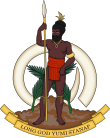Religion in Vanuatu


Approximately 83% of the population of Vanuatu is Christian. An estimated 32% is Presbyterian, 13% Roman Catholic, 13% Anglican, and 11% Seventh-day Adventist.[1] Groups that together constitute 14% include the Church of Christ 3.8%,[2] United Pentecostal Church UPCIV Assemblies of God, and other Christian denominations.[1]
The John Frum Movement, a political party that also is an indigenous religious group, is centered on the island of Tanna and includes about 5% of the population.[1] The Baháʼí Faith, Muslims, Buddhists, Jehovah's Witnesses, and The Church of Jesus Christ of Latter-day Saints (Mormons) also are active.[1] There are believed to be members of other religions within the foreign community; they are free to practice their religions, but they are not known to proselytize or hold public religious ceremonies.[1]
History[]
Missionaries representing several Western churches brought Christianity to the country in the 19th and early 20th centuries.[1] Some foreign missionaries continue this work; however, approximately 90% of the clergy of the established churches are now indigenous.[1] The Summer Institute of Linguistics is active in translating the Bible into the country's many indigenous languages.[1]
Because of the modernities that the military in World War II brought with them when they came to the islands, several cargo cults developed. Many died out, but the John Frum cult on Tanna is still large, and has adherents in the parliament. Also on Tanna is the Prince Philip Movement, which reveres the United Kingdom's Prince Philip.[3] Villagers of the Yaohnanen tribe believed in an ancient story about the pale-skinned son of a mountain spirit venturing across the seas to look for a powerful woman to marry. Prince Philip, having visited the island with his new wife Queen Elizabeth, fit the description exactly and is therefore revered and even held as a god around the isle of Tanna.[4]
Freedom of religion[]
The Constitution of Vanuatu establishes the freedom of religion, and also states that the state is founded on a commitment to "traditional Melanesian values, faith in God, and Christian principles."[5]
Religious groups are required to register with the government or face fines, but this law is not enforced in practice. Religious groups are allowed to establish private schools, and both private and public schools include optional religious education courses.[5]
Since 2016, high ranking members of the government have expressed the intent to define Vanuatu as a Christian country and to prohibit other religions from entering the country. As of the end of 2017, no actual legislation has been passed to this effect.[5]
The Baha'i Faith arrived in Vanuatu in 1953. Local administrative councils, or Spiritual Assemblies, were formed as soon as individual Baha'i communities were large enough. A regional administrative council for the south west pacific islands, including Vanuatu, was elected in 1964. Thirteen years later, in 1977, there were enough Baha'is in Vanuatu for them to elected their own separate National Spiritual Assembly. The community continued to grow sufficiently that in 2012 the erection of a local Baha'i House of Worship, or "Haos blong Wosip" in the local Bislama, was announced, serving as a space for people of all religions and backgrounds to gather, meditate, reflect, and worship. Ground was broken for the structure in 2019 and progress continues.[6] At the groundbreaking ceremony, Vanuatu government officials and traditional leaders highlighted the importance of the local House of Worship on the island, stating that "This Temple will symbolize what we wish to see in Vanuatu in the years to come, which is peace and unity among us all, irrespective of belief" and describing that it "provides us a place where we can meditate deeply about our spiritual reality."[7]
See also[]
References[]
- ^ Jump up to: a b c d e f g h International Religious Freedom Report 2007: Vanuatu. United States Bureau of Democracy, Human Rights and Labor (September 14, 2007). This article incorporates text from this source, which is in the public domain.
- ^ "World Convention » Vanuatu". Retrieved 2012-06-09.
- ^ Fifty facts about the Duke of Edinburgh 25 January 2002 Archived July 25, 2008, at the Wayback Machine
- ^ Squires, Nick (27 February 2007). "South Sea tribe prepares birthday feast for their favourite god, Prince Philip". Daily Telegraph. Archived from the original on 19 April 2007.
- ^ Jump up to: a b c International Religious Freedom Report 2017 § Vanuatu US Department of State, Bureau of Democracy, Human Rights, and Labor.
- ^ "Milestone for Vanuatu Temple uplifts, galvanizes island | BWNS". Bahá’í World News Service. 2019-11-17. Retrieved 2021-08-06.
- ^ "Milestone for Vanuatu Temple uplifts, galvanizes island | BWNS". Bahá’í World News Service. 2019-11-17. Retrieved 2021-08-06.
- Religion in Vanuatu

